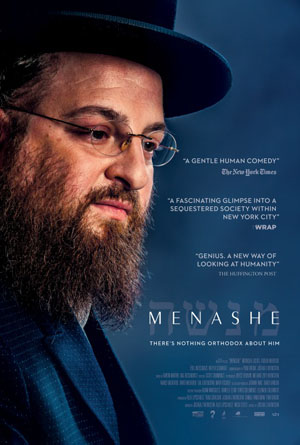 MENASHE
MENASHE(PG)
*** (out of 5)
September 15, 2017
STARRING
Menashe Lustig as MENASHE
Yoel Falkowitz as FISCHEL
Studio: A24
Directed by: Joshua Z Weinstein
BY KEVIN CARR
Because there have been so many movies made over the years, for years, it is unlikely to see something brand new on screen. However, every now and then, audiences are offered a chance to see something they’ve never seen before, even if elements of it are quite familiar.
Joshua Z Weinstein’s movie “Menashe” is one of those films that is wholly unique because of the environment in which is was filmed. However, it still holds common truths and a story that anyone should be able to relate to, regardless of your cultural upbringing.
Filmed entirely in the protective Hasidic Jewish community of New York City, “Menashe” tells the story of a man who has been recently widowed, leaving him with a pre-teen boy to raise by himself. As the one-year anniversary of his wife’s death approaches, Menashe (Menashe Lustig) faces the threat that his son might be sent to live with another family because, according to Hasidic law, there must be a man and a woman present to raise a child.
At its heart, “Menashe” is a universal story. It is about a father trying to hold onto his son, even if the world seems to be working against him. However, set against the backdrop of the Hasidic community, things are complicated by faith and culture.
Like many films in Jewish cinema, “Menashe” sees the ultimate struggle against both tradition and the law (in this sense being Hasidic law rather than municipal, state or federal law). The character of Menashe is not trying to reject his culture, but he is constantly frustrated by the limits it puts on him. He’s also struggling with coming to terms with the hand he was dealt. In this sense, “Menashe” speaks to all of us who is having a tough time coping with some of the unfair cards we are all dealt.
There is no doubt that Menashe loves his faith, and he loves his son. However, he is a bit of a mess. He is a whimsical guy with a good heart, but he also is imperfect. This leads to him irritating some of those around him, whether they are people trying to study scripture silently or his boss handing down reasonable discipline for mistakes he can’t help but making at his job. We all know someone like this (and it might be ourselves), a person constantly dealing with self-inflicted wounds and our own problems of our own making.
What makes “Menashe” so unique is that it is filmed completely in the very guarded Hasidic community. Shot in secret, this is a fantastic look behind the veil of the private community. Most of the story is developed in interior scenes, where dialogue can be worked on by the director, but there are moments where we leave for the street and see life going by. This makes it a strange mix between voyeurism and cultural study.
Still, the heart of the film lies with Menashe, the magnet for unfortunate events and a man unable to rise to the occasion of being both a mother and father to his son. Whether he’s failing to cook even the simplest recipe for his wife’s memorial or whether he is costing his employer hundreds of dollars in lost merchandise, we feel for him. Even when faced with hardship, his outwardly-appearing oppressive culture does have the capacity for forgiveness, charity and hope. And that’s the ultimate point of the movie.
